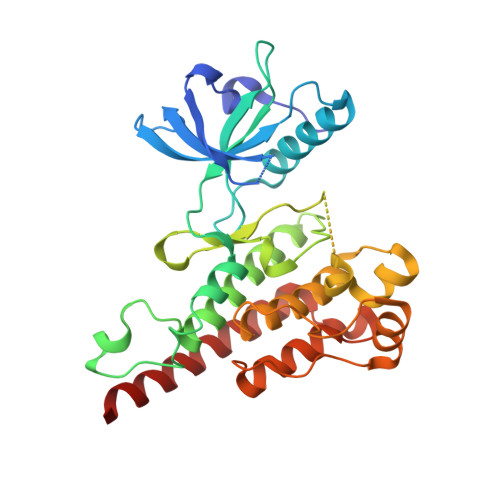Evaluation of a Series of Naphthamides as Potent, Orally Active Vascular Endothelial Growth Factor Receptor-2 Tyrosine Kinase Inhibitors
Weiss, M.M., Harmange, J.C., Polverino, A.J., Bauer, D., Berry, L., Berry, V., Borg, G., Bready, J., Chen, D., Choquette, D., Coxon, A., DeMelfi, T., Doerr, N., Estrada, J., Flynn, J., Graceffa, R.F., Harriman, S.P., Kaufman, S., La, D.S., Long, A., Neervannan, S., Patel, V.F., Potashman, M., Regal, K., Roveto, P.M., Schrag, M.L., Starnes, C., Tasker, A., Teffera, Y., Whittington, D.A., Zanon, R.(2008) J Med Chem 51: 1668-1680
- PubMed: 18324759
- DOI: https://doi.org/10.1021/jm701098w
- Primary Citation of Related Structures:
3B8R - PubMed Abstract:
We have previously shown N-arylnaphthamides can be potent inhibitors of vascular endothelial growth factor receptors (VEGFRs). N-Alkyl and N-unsubstituted naphthamides were prepared and found to yield nanomolar inhibitors of VEGFR-2 (KDR) with an improved selectivity profile against a panel of tyrosine and serine/threonine kinases. The inhibitory activity of this series was retained at the cellular level. Naphthamides 3, 20, and 22 exhibited good pharmacokinetics following oral dosing and showed potent inhibition of VEGF-induced angiogenesis in the rat corneal model. Once-daily oral administration of 22 for 14 days led to 85% inhibition of established HT29 colon cancer and Calu-6 lung cancer xenografts at doses of 10 and 20 mg/kg, respectively.
- Department of Medicinal Chemistry, Amgen Inc., One Kendall Square, Cambridge, MA 02139, USA. mmweiss@amgen.com
Organizational Affiliation:



















